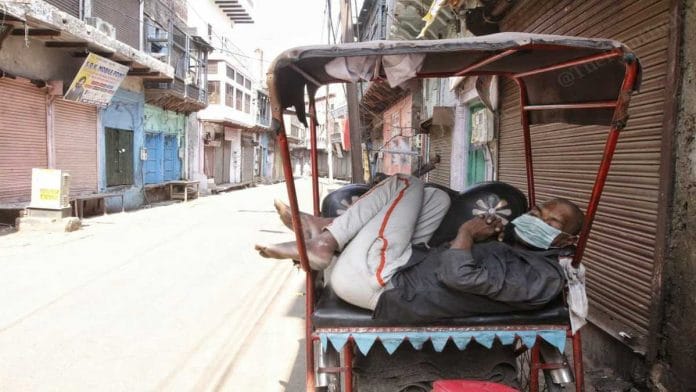New Delhi: Nearly 74 per cent households of around 500 surveyed families in Ahmedabad were not earning regular incomes since the lockdown while 44 per cent said their existing food supply will last less than a week, according to a survey conducted by the Indian Institute of Ahmedabad (IIM-A).
Conducted between 29 March and 9 April by a group of volunteers, including students and staff from IIM-A, the survey is aimed at identifying the difficulties faced by low-income families during the nationwide lockdown initiated on 25 March to contain the spread of coronavirus.
The study also found that 40 per cent of these households were facing urgent issues related to food or medicine supply.
The participants belonged to families of mostly bus/auto drivers, daily wage workers, plumbers, rickshaw pullers, food or vegetable stall owners and cleaners. Around 52 per cent of these people had at least one child enrolled in a government school or an Anganwadi centre.
Also read: Amul to SpiceJet to Railways — Supply chain heroes are making sure India runs in lockdown
No regular income, urgent need of supplies
Of the 74 per cent who have not been earning regular incomes, many also said they would not be able to pay next months’ rent, electricity bills or school fees, notes the survey.
One of the participants has been quoted as saying: “I have no job and have withdrawn all my money from the bank to feed my family of six people.”
Another said: “Due to lack of food and essential items, stores have increased prices and the family doesn’t have enough money to purchase.”
Some also reported that food kits provided by the government and NGOs only come in limited numbers, forcing many to go hungry.
94% unaware of cash transfers
Less than six per cent of 216 households in the survey were aware of money transfers to their accounts by the government under the Covid-19 relief package. The survey states that this could be the result of either transfers not being made or households not having the means to reach banks or ATMs.
It also noted that many daily wage earners who had the APL (Above Poverty Line) ration cards were unable to get food because their cards did not have the NFSA (national food security act) stamp. The places to get these stamps have been shut due to the lockdown. NFSA stamps distinguish the priority households to get ration under guidelines set by the National Food Security Act.
Some were also unable to get ration because their cards had addresses of their villages or was being used for someone who cannot visit the ration shop physically (mainly due to a disability). Others were unable to get ration because the shops in their vicinity were shut or had low supply.
“The first three-four people in a queue get a significant bulk of the ration…post that the ration shops close and other people in the line have to return empty-handed,” the report quotes a survey participant.
Around 80 per cent of those whose children are enrolled in government schools admitted that they had not received any food-related assistance from the Anganwadis or institutes since the lockdown.
Also read: Understand the method in Covid-19’s madness. India doesn’t need complete lockdown






